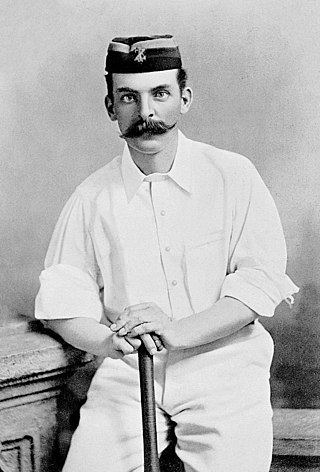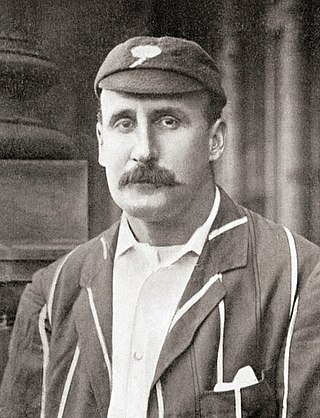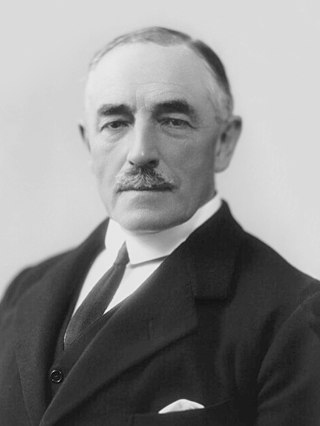
The Ashes is a men's Test cricket series played biennially between England and Australia. The term originated in a satirical obituary published in a British newspaper, The Sporting Times, immediately after Australia's 1882 victory at The Oval, its first Test win on English soil. The obituary stated that English cricket had died, and that "the body will be cremated and the ashes taken to Australia". The mythical ashes immediately became associated with the 1882–83 series played in Australia, before which the English captain Ivo Bligh had vowed to "regain those ashes". The English media therefore dubbed the tour the quest to regain the Ashes.

Ivo Francis Walter Bligh, 8th Earl of Darnley, styled The Honourable Ivo Bligh until 1900, lord of the manor of Cobham, Kent, was a British nobleman, parliamentarian and cricketer.

Allan Gibson Steel was an English amateur cricketer who played for Lancashire County Cricket Club from 1877 to 1893, and in Test cricket for England from 1880 to 1888. He was born in West Derby, Liverpool, and died in Paddington, Middlesex.

Martin Bladen Hawke, 7th Baron Hawke, generally known as Lord Hawke, was an English amateur cricketer active from 1881 to 1911 who played for Yorkshire and England. He was born in Willingham by Stow, near Gainsborough, Lincolnshire, and died in Edinburgh. He appeared in 633 first-class matches, including five Test matches, as a righthanded batsman, scoring 16,749 runs with a highest score of 166 and held 209 catches. He scored 13 centuries and 69 half-centuries.

Test matches in the period 1877 to 1883 were organised somewhat differently from international cricket matches today. All were between Australian and English sides, the teams were rarely representative, and the lengthy boat trip required was one that many cricketers were unable or unwilling to undertake. As such, the home teams enjoyed a great advantage.

Sir John Edward Kynaston Studd, 1st Baronet, known as "JEK", was a British cricketer, businessman and Lord Mayor of London.

Charles Thomas Studd, often known as C. T. Studd, was a British missionary, a contributor to The Fundamentals, and a cricketer.

George Brown Studd was an English cricketer and missionary.
Studd is a family surname and may refer to:

Richard Gorton Barlow was a cricketer who played for Lancashire and England. Barlow is best remembered for his batting partnership with A N Hornby, which was immortalised in nostalgic poetry by Francis Thompson. He was also an umpire and a football referee, including at the record 26–0 score between Preston North End and Hyde in the FA Cup.

Charles Frederick Henry Leslie was an English businessman and cricketer. He played first-class cricket for eight years between 1881 and 1888, for Oxford University, Middlesex and England.

Edward Ferdinando Sutton Tylecote was an English cricketer. He was born in Marston Moretaine, Bedfordshire and was educated at Clifton College and played first-class cricket for Oxford University and Kent County Cricket Club. He also played six Test matches for England. His career lasted from 1869 to 1886.
1882 was the 96th season of cricket in England since the foundation of Marylebone Cricket Club (MCC). England lost to Australia in the match which gave rise to the Ashes.

The Australia national cricket team toured England in 1882. The team is officially termed the Third Australians, following two previous tours in the 1878 and 1880 seasons. At the time, there was no Test cricket and so, as in 1880, the single match between England and Australia was rated first-class only. It has since been retrospectively recognised as a Test match. It also became historically famous as the match which created The Ashes.

An English cricket team toured Australia and Ceylon in 1882–83. Captained by Ivo Bligh, the team was on a quest "to recover those Ashes", a reference to the famous RIP notice that was published in the aftermath of England's defeat by Australia at The Oval in the previous English season.
Brigadier General Herbert William Studd was an English first-class cricketer and soldier.

Reginald Augustus Studd was an English first-class cricketer.

The Ashes urn is a small urn made of terracotta and standing 10.5 cm high, long believed to contain the ashes of a cricket bail or the burnt remains of a lady's veil. It was presented to Ivo Bligh, the captain of the England cricket team, as a personal gift after a friendly match hosted at Rupertswood mansion in Sunbury during the 1882–83 tour in Australia. After his death the urn was presented to the Marylebone Cricket Club, which has it on display at Lord's cricket ground in London. The urn has come to be strongly associated with "The Ashes", the prize for which England and Australia are said to compete in Test series between the two countries.

Herbert William Bainbridge was an English first-class cricketer and footballer. Bainbridge played cricket principally for Eton, Marylebone Cricket Club (MCC), Surrey, Cambridge University and Warwickshire. He was born at Guwahati, Assam, India and died at Leamington Spa, Warwickshire, England.
Marmaduke Francis Ramsay was an English first-class cricketer and a pastoralist in Queensland.
















